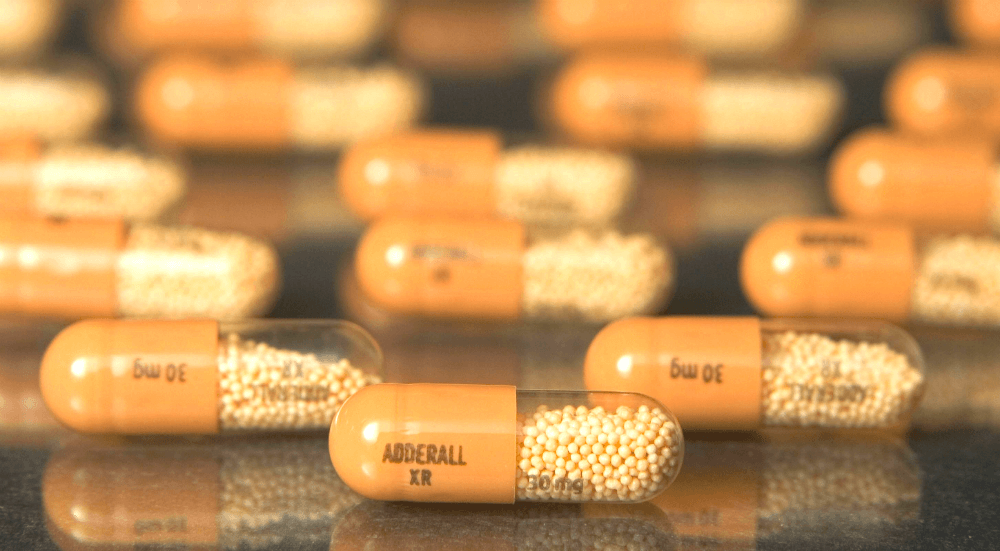Adderall is a stimulant medication commonly prescribed to treat attention deficit hyperactivity disorder (ADHD) and narcolepsy. While it’s known for its ability to improve focus and concentration, some individuals often experience fatigue as a negative after-effect after taking it.
If you are or someone you know is experiencing this fatigue and you’re wondering about possible solutions or alternatives, this article is for you. We’ll explore the drug’s mechanism of action, factors that can contribute to the extreme feeling of tiredness while taking it, and much better alternative meds to consider. Let’s dive in.
What Is Adderall?
Adderall is a brand name for the combination of two active ingredients, amphetamine and dextroamphetamine, that belongs to a class of drugs known as central nervous system (CNS) stimulants. It is an FDA-approved prescription medication primarily prescribed to treat ADHD – a neurodevelopmental disorder characterized by symptoms such as impulsivity, inattention, and hyperactivity. Adderall is also used to manage symptoms of narcolepsy, a sleep disorder that causes sudden episodes of emotion-triggered muscle weakness, excessive daytime sleepiness, and disrupted sleep patterns [1].
Adderall is available in two forms: immediate-release (IR) and extended-release (XR) formulations. The immediate-release formulation is typically taken multiple times a day, while the extended formulation requires fewer doses, as it provides a gradual release of the medication throughout the whole day. Both formulations come in varying doses to accommodate individual needs and treatment plans. Adderall IR comes in the following doses: 5 mg, 7.5 mg, 10 mg, 12.5 mg, 15 mg, 20 mg, and 30 mg tablets, while Adderall XR comes in the following dose strengths: 5 mg, 10 mg, 15 mg, 20 mg, 25 mg, 30 mg capsules.
In terms of safety, Adderall is considered effective when used exactly as prescribed and under the supervision of a professional healthcare provider. However, like every other medication, it carries the risk of potential negative after-effects. The most common adverse effects include [2]:
- nausea;
- mood swings;
- palpitation;
- nervousness;
- dizziness;
- headache;
- weight loss.
Although less common, Adderall can also cause more serious negative after-effects. Some of them include vomiting, seizures, stroke, slowing of height and weight in children, urinary tract infections, fever, and blurry vision. It’s important to contact a healthcare professional if side effects persist, cause serious discomfort, or interfere with day-to-day activities.
Adderall can be highly effective in improving symptoms and quality of life for many people who take it. However, it is a serious medication with potential risks and side effects that should not be overlooked. It’s always advisable to weigh the potential benefits against the risks and side effects associated with drugs and choose an alternative if necessary.
How Does It Work?
Adderall works by increasing the levels of certain neurotransmitters in the brain, particularly dopamine and norepinephrine. These neurotransmitters are chemical messengers that play a crucial role in regulating various functions in the brain, including attention, arousal, and motivation.
The active ingredients in Adderall, amphetamine and dextroamphetamine, function as CNS stimulants. They work by stimulating the release of dopamine and norepinephrine from nerve cells in the brain and by blocking their reuptake, i.e., preventing the neurotransmitters from being absorbed back into the nerve cells [3].
Dopamine is associated with the brain’s reward system and is involved in regulating mood, motivation, and pleasure. By increasing dopamine levels, Adderall can enhance feelings of alertness, motivation, and energy levels, which can help improve focus and attention in people with ADHD. On the other hand, norepinephrine is involved in the workings of the body’s “fight or flight” response and plays a role in the regulation of blood pressure, heart rate, and alertness. By boosting norepinephrine levels, Adderall can improve concentration and vigilance and lead to increased concentration [4].
While Adderall is effective, it’s important to only use it under the guidance and supervision of a doctor and strictly adhere to their guidance to minimize the risk of potential adverse effects, misuse, and dependence.
What Factors Can Cause Fatigue While Taking Adderall?
While this medication is generally really effective in improving focus and concentration, it’s not uncommon for some individuals to sometimes experience fatigue. Here are some of the factors that often contribute to it:
- Dopamine rebound: Upon taking Adderall, it boosts focus, attention, and energy levels at first, but as its initial effects begin to wear off, it causes a “crash” or dopamine rebound in some users, which makes them feel very tired and lethargic [5];
- Dehydration: Even on a low dose, stimulant medications like Adderall often speed up the body’s metabolism rate. When metabolism increases, the body generates more heat, ultimately leading to sweating (as a way to cool down). The increased sweating causes the body to lose more water and electrolytes, which results in dehydration if the fluids aren’t replaced. Dehydration causes some bodily systems to work harder, which leads to fatigue [6];
- Sleep disturbances: Adderall can interfere with sleep patterns, leading to insomnia or restless sleep. Poor sleep quality can result in daytime fatigue;
- Tolerance: Consecutive use of this medication can cause tolerance, ultimately leading to users requiring higher doses to achieve the same effect. Since lower doses of Adderall may no longer be sufficient to combat the ADHD symptoms, it may lead to fatigue;
- Time of administration: Taking the medication too late in the day, especially in the afternoon or evening, can disrupt sleep and contribute to fatigue the next day.
Note that this is not an all-encompassing list of factors contributing to fatigue; other factors such as stress levels, diet, concurrent medical conditions, and overall health may also play a role in determining how the medication affects energy levels. What’s more, it’s important to know that causative factors may vary from individual to individual, as responses to the medication differ. It’s advisable to discuss any concerns or negative after-effects with a healthcare professional.
Alternative Drugs to Adderall
Whether you’re seeking an effective first treatment for narcolepsy or ADHD or just in search of better alternatives, there are two great alternative medications to consider:
- Modafinil (Provigil): Modafinil is a medication approved by the FDA and primarily prescribed to promote wakefulness in individuals with sleep disorders such as narcolepsy, shift work sleep disorder (SWSD), and obstructive sleep apnea (OSA). It is often prescribed off-label to enhance cognitive function and manage the symptoms of ADHD. Compared to Adderall, modafinil is highly safe, tolerable, and effective. It has a relatively low potential for dependence and addiction, as well as a low risk of side effects;
- Armodafinil (Nuvigil): Armodafinil is a medication approved by the FDA and is similar to modafinil. It is primarily prescribed to treat the same sleep-related conditions that modafinil is approved for, and it is also used off-label to manage the symptoms of ADHD. While this medication has a safety profile similar to modafinil, it produces a slightly stronger effectiveness, making it suitable for individuals who require a more potent wakefulness-promoting agent.
These medications serve as effective options for managing narcolepsy, ADHD, and other sleep-related disorders. They have been in use for a relatively long period of time and have demonstrated safety and efficacy in clinical trials. However, while they’re generally better alternatives to Adderall, they equally have the potential to cause side effects.
It is important to seek advice from a doctor before starting treatment for either of them.
So, Why Does Adderall Make You Tired?
The number of Adderall users who experience tiredness in the morning after popping the pill is generally low, estimated to be around 2% to 4%. Still, you’ll often come across questions such as, “Why does Adderall make me tired?” and “Is it normal to be exhausted even after consecutive use of Adderall?” on Q&A platforms like Quora, among others. This is because individuals experience varying responses to it. Generally, factors such as dehydration, dopamine rebound, poor sleep quality, and time of administration can contribute to feelings of tiredness while taking the medication. It is advisable to discuss any concerns or side effects you experience while using Adderall with your healthcare provider, or consider alternatives like modafinil.
References
- Adderall: Side effects, dosage, with alcohol, and more. Written by MNT Medical Network. Medically reviewed by Victor Nguyen, PharmD, MBA. Retrieved: March 20, 2024. Medicalnewstoday.com.
- Adderall Dosage: Common Adderall dosages for Adderall and Adderall XR. By Austin Ulrich, PharmD, BCACP. Retrieved: March 20, 2024. Goodrx.com.
- What Does Adderall Do to Your Brain? It Depends. By Caron Staff. Retrieved: March 20, 2024. Caron.org.
- Dopamine and Noradrenaline in the Brain; Overlapping or Dissociate Functions? By Yadollah Ranjbar-Slamloo and Zeinab Fazlali. Retrieved: March 20, 2024. Frontiersin.org.
- Adderall Withdrawal: Symptoms, Timeline, and Treatment. Written by Corinne O’Keefe Osborn. Medically reviewed by Akeem Marsh, MD. Retrieved: March 20, 2024. Verywellmind.com.
- Why Does Adderall Make Me Tired? Retrieved: March 20, 2024. Choicehousecolorado.com.








